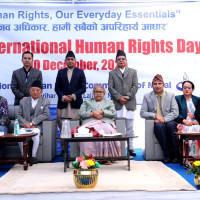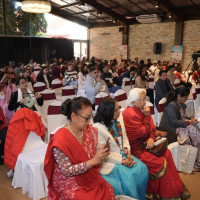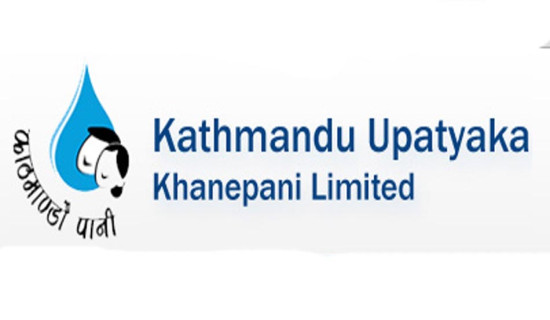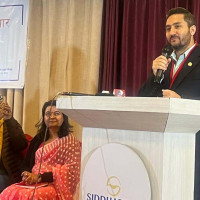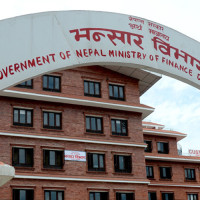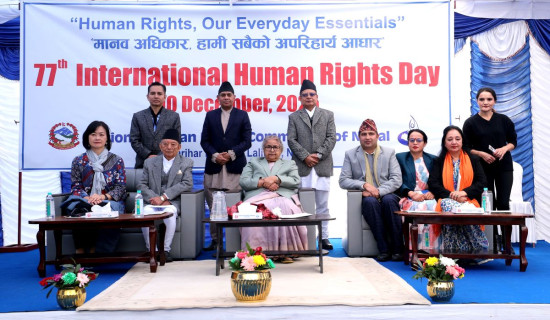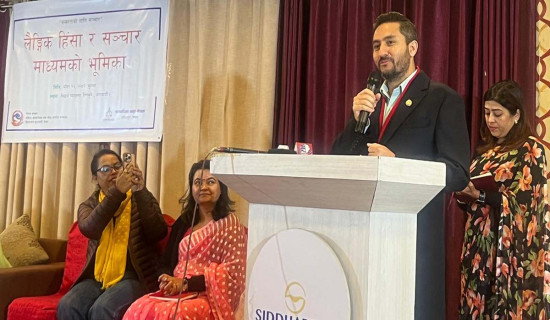- Wednesday, 10 December 2025
Butwal becoming vibrant economically, touristically
By Neera Gautam, Rupandehi, May 29: Butwal was called Batauli. Batauli bazaar is still alive but wears a deserted look within the entire existing modern Butwal in the Rupandehi district in Lumbini Province.
The bazaar with narrow alleys is of historic importance dating back around 600 years and bordering the Jitgadhi Killa (fort), which Nepal claimed by fighting a war with the British Army, lies with the Nuwakot Killa (fort) at its head.
Near the Nuwakot fort sits the historic Bhairab temple. Near the fort that is connected with the Buddhist civilization was the meditation centre belonging to Rishi Kaldewal (Aashutosh), Guru of King Suddhodhana, the father of Gautam Buddha.
Now, in view of its historic and archaeological importance, the authorities concerned have rolled up their sleeves to conserve and protect historic Batauli. A section of people is in favour of carrying out the integrated development of Batauli which sits on the western banks of the Tinau River and carries with it rich history, culture, civilisation and archaeology.
Having had keen interests in carrying out the integrated development of Batauli and the Nuwakot fort and understanding their touristic importance, the entrepreneurs have been at work to run the cable car service in the area.
Existing Butwal has had a facelift with development activities including wide roads, high-rises, well-managed bazaar. Butwal being developed as a well-equipped and well-managed city is a major city in west Nepal.
Serving as a transit for tourists heading to popular tourist destinations, Palpa, Pokhara, Muktinath and Dhorpatan, the city that sits in the central part of Nepal and borders Sunauli transit with India has attracted a crowd of human migration. At the head of the city lies the Basantapur hill.
Two cable cars will be operating in the area soon. Big and small hotels and restaurants are being opened and construction of other infrastructures for business purposes is underway targeting tourists especially Indian ones who would visit the area to ride the cable cars.
Butwal-Khasyauli Municipality was named on 15 February 1960. The municipality was called Butwal-Khasyauli Nagar Panchayat during the Panchayat system. The king from the Sen dynasty set up the human settlement in Batauli, according to historian Debendra Raj Shakya.
Batauli Bazaar lies across the Tinau River from the existing main bazaar. Over time, human settlements and bazaars were built on the other side of the river. Later, the bazaar was developed as Butwal after infrastructures were added, and human settlements densely were built. Butwal Municipality was named in 2046 BS. Later in 2071 BS, the municipality was upgraded to a sub-metropolitan city by acquiring then Semlar and Motipur VDCs. Butwal has a six-lane road, the international convention centre and an exhibition hall.
The Lumbini Cable Car and Siddhartha Cable Car are operating soon in the area. Then Prime Minister KP Sharma Oli on 13 February 2021 laid the foundation stone for the Lumbini Cable Car, and then Finance Minister Bishnu Prasad Paudel on 21 February 2021 laid the foundation stone for the Siddhartha Cable Car.
Construction of the Lumbini Cable Car is almost over, said Gokul Saud, the cable car manager. The cable car links historic and archaeological Basantapur at Tinau Rural Municipality-3 on the border of Butwal and Palpa. Currently, the cable care is being tested with the aim of operating it regularly from May 29, he said.
Preparations are underway to officially inaugurate the cable car coinciding with the Mahayagya being organised at the recently constructed Kamachhya Devi Temple in Basantapur. The bottom station is at Bamghat and the top station is at Basantapur. The cable car has nine pillars and 25 gondolas with the capacity to carry eight passengers each. The cable car has the capacity to carry 600 passengers per hour from the bottom to the top stations, he said. It takes around 10 minutes to reach Basantapur from Butwal on the cable car.
Hotels, restaurants and resorts are being opened here. Construction of infrastructures for a children's park and a view tower is underway.
The three kilometres cable car has used 6.27 hectares of forestland granted by the government for use for 25 years (3.16 hectares belonging to the Chure community forest at Butwal-3, and 3.11 hectares of the Chiuridanda Nyauli community forest at Tinau-3 in Palpa).
The over Rs 1.5 billion projects can attract tourists especially Indian ones visiting Basantapur to see and enjoy the natural beauty of the area and local people who are on the lookout to avoid the hot temperature of Butwal Bhairahawa, Saud expressed hope. The average temperature in Basantapur Hill ranges between 12 and 14 degrees during summer.
An estimation of over Rs 1.5 billion worth of investment is expected to spend on building other infrastructures including hotels, restaurants, resorts and a park, he said.
Similarly, located in Butwal, the Siddhartha Cable Car has used 3.29 hectares of forestland granted by the government for use for 30 years. It plans to operate the project in the next five months, said Rajendra Singh Gurung, chair of the project company. The project has around Rs 1 billion worth of investment from the private sector and the community, he said.
The bottom station of the cable car linking Lumbini, the birthplace of Gautam Buddha is at Shikhar Deurali and the top station is at Nuwakot of Palpa district. The 1.94 kilometres cable car has 25 gondolas with a capacity of carrying eight passengers each. One can reach the top station in seven minutes on the cable car. Around 500 passengers can ride the cable car per hour from the bottom to the top stations when it comes into full operation, said engineer Shristi Gurung.
"We have built earthquake-resistant structures," she said.
A five-star hotel, a park and resorts are being opened in the area. "This investment may revive old Batauli. There are not many development activities in Batauli as that in Khasyauli. So, the project has started in a bid to carry out development activities and promote tourism in the area," he said.
The construction of a temple of Kalbhairav, a big statue of Buddha, Manimukunda Sen Park, a cultural museum and a temple of Rishi Kaldewal in Nuwakot is underway. A view tower has been constructed, and the foundation stone has been laid for the construction of a temple of Balaji. A Guru from Balaji Temple in India laid the foundation stone for the project during a function.
Aside from being a hub for economic activities and trade, Butwal is also a historically, religiously, culturally and archaeologically important place. There is the Jitgadhi fort where the Nepal Army won a war against the British Army, the Mani Mukunda Sen Park at the winter palace of King Mani Mukunda Sen, and the place where the jaw of Ramapithecus, considered to be an ancestor of humans, has been kept in the vicinity of Shikhar Deurali.
Similarly in Nuwakot, there is the summer palace of King Mani Mukunda Sen, 'Top han (canon firing) zone, a treasury house, and a Rani Kuwa (pond).
There are Siddha Baba Temple, Ganesh Temple, Radha Krishna Temple, Nilkantha Baba Dham, Kalika Temple, Ram Temple, Bagbhairab Bhubaneshwori Temple, the Buddhist monastery, and Padhma Monastery.
The government should construct another cable car from Gaddhaheight at Siddhababa to Nuwakot to attract more tourists to Butwal, said entrepreneur Madhav Nepal, also chairperson of the Nuwakot Development Committee. (RSS)

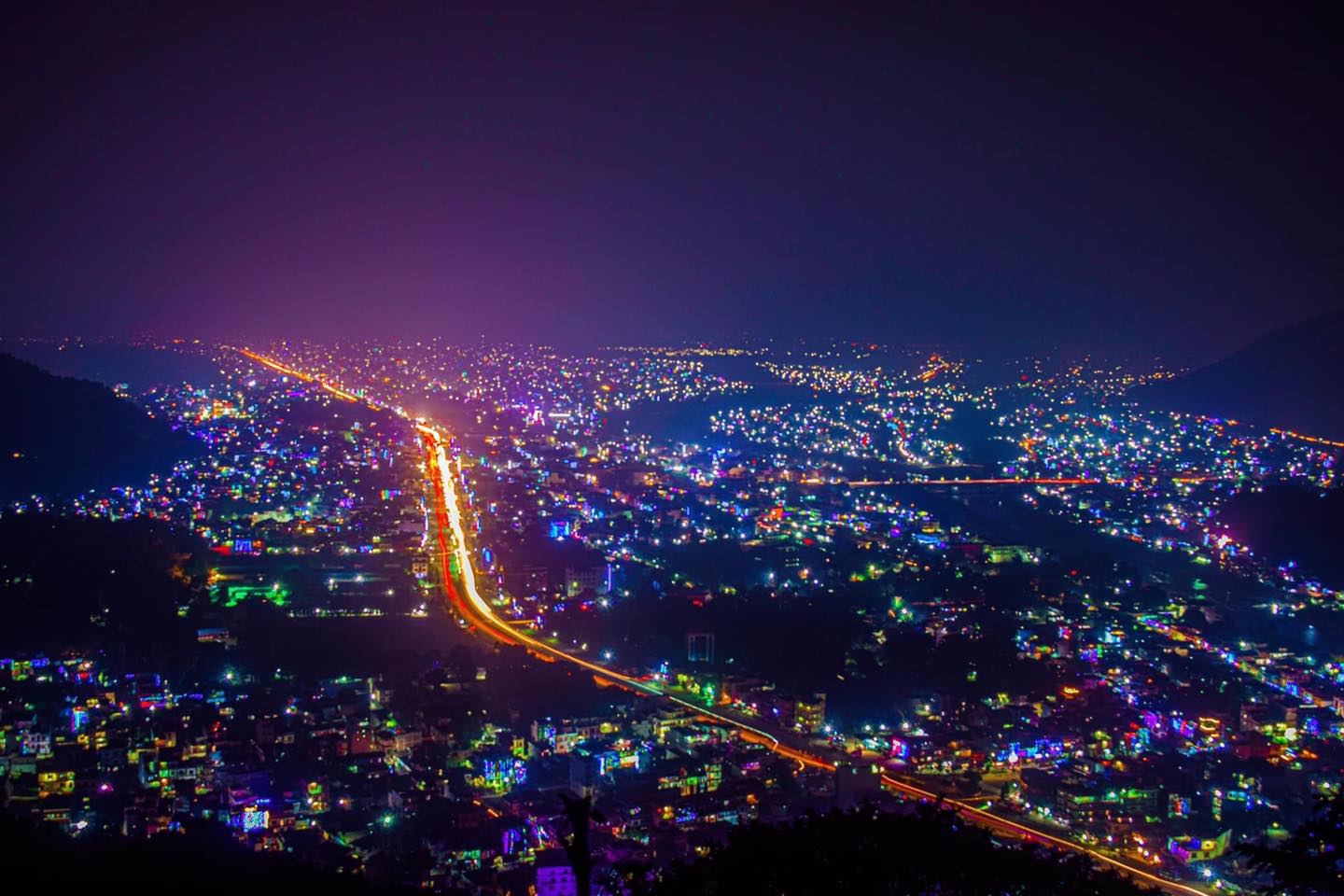

-original-thumb.jpg)
